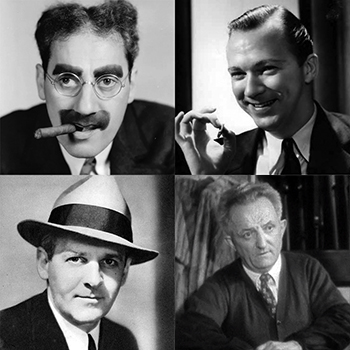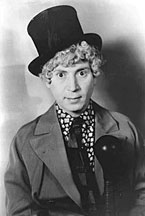 One of the joys of being an old-movie buff is when an actor in a bit part sparks your interest and you start to do a little research on him or her, which causes you to tumble down a rabbit hole of odd facts and coincidences. Sometimes one finds unlikely connections between that unfamiliar performer and some much bigger names—such as when, say, Groucho Marx, Lee Tracy, and Walter Winchell have a connection to…Milton Wallace?
One of the joys of being an old-movie buff is when an actor in a bit part sparks your interest and you start to do a little research on him or her, which causes you to tumble down a rabbit hole of odd facts and coincidences. Sometimes one finds unlikely connections between that unfamiliar performer and some much bigger names—such as when, say, Groucho Marx, Lee Tracy, and Walter Winchell have a connection to…Milton Wallace?
We recently attended a screening of Blessed Event (1932), a classic precode comedy in which Lee Tracy plays a character that was obviously inspired by gossip columnist Walter Winchell, who was all the rage back then.
We were especially excited to attend the screening, as we had been informed that some footage that had long since been excised from the picture had been restored. Reportedly, it had been there all along, but only in the print that belonged to the Library of Congress. Virtually no one knew about it till Bruce Goldstein, director of repertory programming at NYC’s Film Forum, screened the print at the TCM film festival and realized what a find he’d uncovered.
For those not familiar with Winchell, we’ll catch you up just a bit: A former vaudevillian, he turned to a scandal-mongering form of journalism when his performing career wound down. His popular newspaper column was syndicated and he had a huge following on national radio, too. He was known for coining any number of phrases still used today, including the above-cited “blessed event” used to signal the pending birth of a baby (the guardians of broadcasting decency in those days were convinced that American ears were too tender for that oh-so-coarse term “pregnant”).
Winchell’s broadcasts included remotely broadcast performances by bands and singers around the country, and right before switching to those remote locations, he would blow a siren whistle and say, “Okay, America!”
In the film, as the title suggests, Tracy’s Winchell-esque character relies on the same “blessed event” catchphrase that Winchell used. But in the restored scene, a short, middle-aged, somewhat stereotypical (though not, in our opinion, disparagingly so) Jewish man, played by one Milton Wallace, shows up at the newspaper office to give Tracy a “blessed event” tip: He, Mr. Moskowitz, and his wife are soon going to have their seventh child and he thinks maybe Tracy would want to put that into his column.

